The beautiful thing about writing alternate history and historical fantasy, in my opinion, is that history itself offers enough crazy, nigh-implausible stuff to do half the job for you. Yet when I wrote my Daedalus trilogy, I kind of felt the weight of that history on my shoulders, even as I played with it, because I felt I had to do it justice. I took the Napoleonic Era naval fiction of C.S. Forester and Patrick O’Brian as a starting point, then transported it into a setting of alchemy-fueled space opera: my Venus has lizard-aliens, my Napoleon has a zombie army. It’s high adventure on the scale of both history and the Solar System.
But it still has to work. Writing any sort of alternate history or historical fantasy is tough, because without a solid foundation of logical extrapolation—chasing down the what-ifs of the changes you’ve made to history—it folds like a house of cards. I’d like to think mine holds up well, but it’s a balancing act, to be sure.
Here’s five books set in five different eras that, I think, make history both fantastical and fantastic to read, plus a few extra books thrown in because they’re worth it.
His Majesty’s Dragon—Naomi Novik
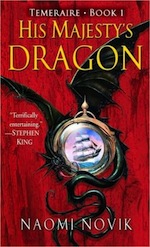 When you think of historical fantasy in the Napoleonic Era, this is the book you think of. Novik introduced a single element—dragons—into the setting, then extrapolated brilliantly into what it would mean for the nations of Europe to use them in battle during Napoleon’s wars. Strong characterization and nifty action make it a fun ride, too.
When you think of historical fantasy in the Napoleonic Era, this is the book you think of. Novik introduced a single element—dragons—into the setting, then extrapolated brilliantly into what it would mean for the nations of Europe to use them in battle during Napoleon’s wars. Strong characterization and nifty action make it a fun ride, too.
Also worth it: Jonathan Strange & Mr. Norrell by Suzanna Clarke. Same era, less war, more magic and faeries, no dragons. Clarke’s voice nails the period so well.
Bitter Seeds—Ian Tregillis
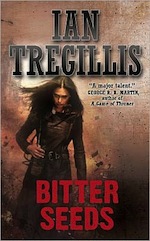 Superpowered agents with pulp-fiction technology and British warlocks wage a secret war across Europe during World War II and the Cold War—and then things get even stranger after that. Yet despite all the moving parts, Tregillis runs with it well. Much of the success has to do with Reybould Marsh, his everyman-spy at the center of the chaos.
Superpowered agents with pulp-fiction technology and British warlocks wage a secret war across Europe during World War II and the Cold War—and then things get even stranger after that. Yet despite all the moving parts, Tregillis runs with it well. Much of the success has to do with Reybould Marsh, his everyman-spy at the center of the chaos.
Also worth it: Fatherland by Robert Harris was one of my very first straight-up alt-history reads. (In other words, no magic.) Excellent crime thriller set in Nazi-dominated Europe in 1964.
Anno Dracula: The Bloody Red Baron—Kim Newman
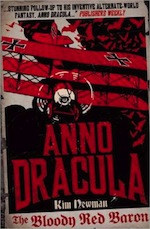 I first heard about this book while prepping for a World Fantasy Convention panel on WWI alt-history. And it’s a heck of a ride, positing Dracula’s rise to lead the armies of Germany and Austria during the Great War—and the Red Baron as particularly bloody indeed. The rest of the series, set in other eras, is a fascinating take on both history and an iconic literary character.
I first heard about this book while prepping for a World Fantasy Convention panel on WWI alt-history. And it’s a heck of a ride, positing Dracula’s rise to lead the armies of Germany and Austria during the Great War—and the Red Baron as particularly bloody indeed. The rest of the series, set in other eras, is a fascinating take on both history and an iconic literary character.
Also worth it: The Mechanical by Tregilis (again!) is set a few years after WWI, but is a great, fresh hack at clockwork-punk.
Boneshaker—Cherie Priest
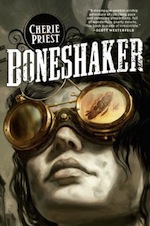 I didn’t really know how much I loved the Weird West until I read Cherie’s book. It boasts a rich setting featuring Western steampunk mixed with zombie horror, and yet it’s still a great tale about a mother looking for her son. The series goes on to expand the setting in creative and unique ways. Just a lot of fun.
I didn’t really know how much I loved the Weird West until I read Cherie’s book. It boasts a rich setting featuring Western steampunk mixed with zombie horror, and yet it’s still a great tale about a mother looking for her son. The series goes on to expand the setting in creative and unique ways. Just a lot of fun.
Also (likely) worth it: Vermilion by Molly Tanzer. Full disclosure, I haven’t read this yet, but the reviews have been staggeringly good for this debut novel about a professional psychopomp in the Weird West.
The Guns of the South—Harry Turtledove
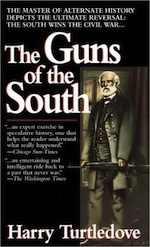 You can’t do a list like this without Harry—he’s the alt-history master. And this is the book he’s arguably best known for—one in which a time traveler supplies struggling Confederate General Robert E. Lee with AK-47s and helps turn the tide of the Civil War. Turtledove’s work is richly detailed and intricately plotted as he takes history down some of the most fantastic tangents imaginable.
You can’t do a list like this without Harry—he’s the alt-history master. And this is the book he’s arguably best known for—one in which a time traveler supplies struggling Confederate General Robert E. Lee with AK-47s and helps turn the tide of the Civil War. Turtledove’s work is richly detailed and intricately plotted as he takes history down some of the most fantastic tangents imaginable.
Also worth it: Turtledove’s 11-book Southern Victory series, which starts with How Few Remain in an alternate Civil War, and ends with In at the Death in a very different World War II. It’s a huge series, but worth the trip.
Michael J. Martinez is a writer of genre-bending speculative fiction and the occasional bit of short fiction. His latest book, The Venusian Gambit (May 5), “seamlessly blends popular elements from science fiction and fantasy, producing a work that raises the bar for both,” according to Publishers Weekly’s starred review. He’s also an avid traveler and homebrewer. You can find Mike at his blog, on Twitter and on Untappd.










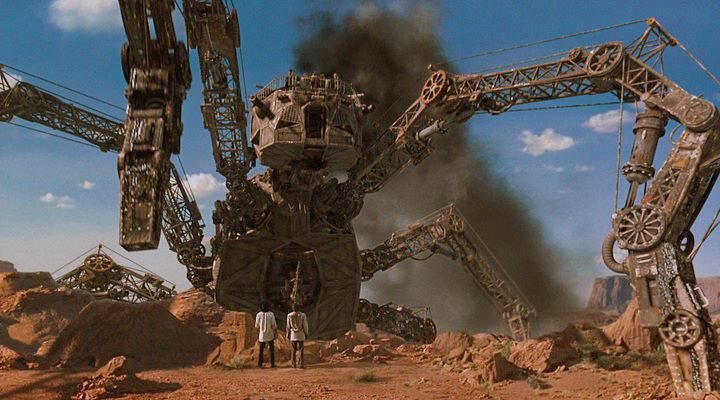
Two of my favorites: Philip K. Dick’s The Man in the High Castle is the iconic “Hitler wins” novel, though it’s rather more involved than all that and there’s the Keith Roberts classic Pavane where the Spanish Armada was successful, resulting in centuries of technological and social repression.
You can’t go wrong with anything by Guy Gavriel Kay.
Mercedes Lackey’s “Elemental Masters” that runs from the Late Victorian to post-WW1. It’s suitable for younger readers, too.
Tina Connolly’s series beginning with IRONSKIN. Late Victorian.
Ransom Riggs’ “Miss Peregrine’s Peculiar Children” series. WWII and present day.
Stefan Bachman’s “The Peculiars.” Victorian.
Galen Beckett’s THE MAGICIANS AND MRS QUENT. Victorian.
Jo Walton’s Small Change trilogy is one of my alt history favs along with Temeraire.
PS: Googling the name of the trilogy I finally got the pun of the titles :/
Tons of books I could mention.
Mary Robinette Kowal’s Glamourist Histories, early 19th century history with glamour magic
Anne Lyle’s Elizabethan series starting with the Merchant of Souls–a North America with fae of a sort, changing history in their existence.
The Moon and the Sun has the Court of Louis XIV deal with the arrival of a captured sea monster.
Jasper Fforde’s Thursday Next books include several alternatives. Germany won the war, but more important, literature has rockstar-like cultural status.
One of my favorites is Guy Gavriel Kay’s Sarantine Mosaic, which is loosely based on the Byzantine Empire during Justinian’s rule. It doesn’t really take place on our world, but the paralells are pretty strong.
Juliet Marillier also has several works that take place in a kind of historic fantasy setting in the times of the ancient Celts/Britons/Picts, etc.
Robert Silverberg did one called Roma Eterna, in which the Roman Empire survives to the present day. It’s more of a fixup than a novel, I think – it is made of semi-independent short stories.
Interesting note on the hydrolic powered mechanical spider from Wild Wild West: Spiders are natural hydrolic. Their legs move by pushing their blood into and out of their legs. Thats why they can move faster when its warming since the fluid moves faster. #spiderfacts
The Stratford Man duology by Elizabeth Bear for Shakespeare & Kit Marlow action.
A really interesting one (and kind of a meta-alternate history) is The Alteration by Kingsley Amis.
Tregillis doesn’t get nearly enough attention.
Technically though Dracula would have been fighting alongside the Russians against the Germans and Austrians as Romania was with the Allies in WWI.
Robert Conroy has a number of alt-history books out. Currently reading 1920: America’s Great War and it is pretty good. It is set in a world where the Germans won the Battle of the Marne.
Harry Turtledove also has the sci-fi alt history Worldwar/Colonization series, the Lost Legion/Videssos series about a Roman Legion in a Byzantine inspire3d fantasy world.
William Forstchen and Newt Gingrich have a very enterntaining alt-history trilogy set in the Civil War where Lee wins at Gettysburg. They also have a WWII set of books that I’ve not yet read. Picked up a signed copy for my uncle for Christmas a few years ago and he really enjoyed them though.
Philip Roth’s “The Plot Against America” is another good one in this genre.
“Back in the USSA” by Eugene Byrne & Kim Newman. Like the “Anno Dracula” series, it blends fictional history and “real” history: in 1912, Charles Foster Kane becomes President, and by 1917 Eugene V. Debs has led a successful revolution to turn the US into a socialist state, with the US becoming the equivalent of the USSR. It’s a collection of linked short stories with some characters recurring in major or minor roles from the period 1912 through the 1990s.
Guy Gavriel Kay isn’t alt-history – his books (except for bits of the Fionavar Tapestry) aren’t set on Earth. Most of them are fantasy worlds with cultures very parallel to specific Earth cultures, but not the same.
What about something like Abraham Lincoln, Vampire Slayer? I haven’t read it myself, but it sounds right up the alt-history alley.
I love this blog series but I wish some of the topics weren’t so broad. This one is just not specific enough. Like the one recently about magical realism. That’s an ENTIRE GENRE, we don’t need a list of only 5 books.
The Belisarius series by Eric Flint and David Drake. Rome vs India.
The Ring of Fire or 1632 series by Eric Flint, David Weber, and pretty much every other person who ever hung out at the Baen Bar by this point. US town and its surrounding area is transported to Europe in the year 1632. Modernisation ensues. Fast.
Guy Gavriel Kay, as mentioned above, but also Ysabel, since that is in our world.
Pastwatch, by Orson Scott Card, combines alt history with time travel.
The Years of Rice and Salt, by Kim Stanley Robinson. What if the Black Death killed nearly everyone, not just some.
Lest Darkness Fall, by L. Sprague de Camp, avoiding the dark ages by double-entry bookkeeping.
It’s YA, but I really enjoyed Scott Westerfield’s LEVIATHAN and its sequels. WWI with giant robots and biologically engineered monsters.
@@.-@, about Jo Walton’s alt-history series : in a way, we could add Josephine Tey’s Brat Farrar. It’s a seemingly conventional mystery story, published and apparently set in 1950’s England. But it seems to be an England, and a Europe, where World War II never happened. The story as told would be highly unlikely if the war had occurred according to the usual histories, and I believe that Jo Walton cites the book as one of the inspirations for the “Small Change” series.
On the “history with additions” side, there’s Kit Whitfield’s In Great Waters— medieval England in a world where the thrones of Europe have been held for centuries by half-human descendents of mer-people.
And Marie Brennan’s “Onyx Court” series, London history from Elizabeth I to Victoria, but with fairies. And dragons and such, too.
Michael Moorcock’s Oswald Bastable books (Warlord of the Air, etc.) — they’re relatively slight, but fun.
Harry Harrison’s “Stars and Stripes” series, Harry Turtledove’s “The War Came Early” series
And a more extreme example: Harry Harrison’s East of Eden series — the Chicxulub impact never took place …
Ironic that both the best and worst examples of Harry Turtledove are presented here in the same post. “The Guns of the South” is a quick fun read, whereas the vast majority of his alt-history is a slog, rife with stiff stilted dialog and way too many “Forest Gump-isms” for my liking.
@26 For really good alt history Turtledove I’d recommend “The Case of the Toxic Spell Dump”
Lest Darkness Fall, by L. Sprague De Camp
Judith Tarr has written a great many excellent historical fantasies,in a very wide variety of settings and eras – Egypt under the Hyksos, Alexander’s empire, medieval Europe, England under William the Conqueror, Outremer, Central Asia.
Gillian Bradshaw did a brilliant historical fantasy about the Hellenic kingdoms of the Ferghana Valley “The Horses of Heaven”.
The Dragon Waiting by John M. Ford. It’s the period we call the Renaissance, but “the beauty of fair Greece and the grandeur of old Rome” are not ruins and ancient wonder tales. Byzantium, far from tottering on the brink of ruin, is hugely powerful, thanks to the far-sighted policies of the Blessed Julian, whose doctrine clearly states that no religion shall be the sole religion of the Empire. As a result, Christianity is an obscure cult and Islam is not even on the protagonists’ radar. Without a coherent threat from the east or south, and not crippled by constant squabbles over purity and who can out-Christian everyone else more expensively, the Empire is seeking more territory in the West. Opposing Byzantium is the burgeoning power of England, built up without the distraction of Crusade. England has almost devoured France; Byzantium is moving on Italy.
Along with the alternate history there are touches of magic and folklore. Vampirism (called “porphyria”) is a disease, and it is not a sparkly or sexy one. Magic of transformation, etc., is possible, within strict limits. I think of this timeline’s magic as very Roman in flavor: it’s another way to get stuff done, within certain limits and after a lot of study. A wizard in this story is comparable to an engineer.
It was published in 1984, but I think it holds up well.
I’m always a bit miffed when people mix alternate history (… for want of a nail, the horse took a detour and everything changed) with time travel stories (… the negative space wedgie took a a modern aircraft carrier into WWII and everything changed). Both can be interesting exercises in speculation, and both can be fun reads, but they’re not the same.
U.S. War of Southern Aggression alternate histories = white men win; African Americans lose; everyone happy; feh.
@32 Turtledove usually problematizes a victory of the Confederate States. In one of his series, they turn into an almost exact mirror of Nazi Germany. So not everybody happy.
Jack Whyte’s interpretation of Camelot as a colony holding true to Roman ideals after the Roman’s exited Britain and developing over the course of approximately a century is great. Oddly enough, when Arthur becomes the main character is when it’s at it’s weakest. I suppose the fact that he can’t win anything of substance severely limits his story arc.
Also, anything by Conn Iggulden. I’d choose the Geghis Khan series over the Julius Caesar series but both are great historical fiction interpretations. Not technically SFF, but still a very good read.
First thing that comes to mind for alt history is the Tales of Alvin Maker by Orson Scott Card
@32 “Bring the Jubilee” by Ward Moore: The South wins at Gettysburg and goes on to win its independence. Set in the years 1921 – 1952, nobody is happy: the North is a permanently impoverished, backward, Third-World country, while the South triumphant is ruled by an elite with full citizenship only for those descended from white pre-1865 Southerners; other whites are second-class citizens and blacks, although technically “free,” are non-citizen peons. The lack of a unified, democratic America has left the rest of the world “backward” as well, with kings and emperors still ruling in Europe and technology stunted at 1870s level.
I’d also add Steven Barnes Lion’s Blood and Zulu Heart to the list. His alternate America with an African dominated society was honestly what got me into alternate historical novels in the first place.
I haven’t read the comments but hope somebody covered off the Conrad Stargard series by Leo Frankowski. It’s an exciting romp through 13th century Poland with wild time travel tech tricks thrown in.
Tim Powers.
Kate Elliott’s Spiritwalker trilogy is pretty fabulous. I don’t think it’s framed in a specific time, but it’s definitely set in our world—if our world had magic, of course.